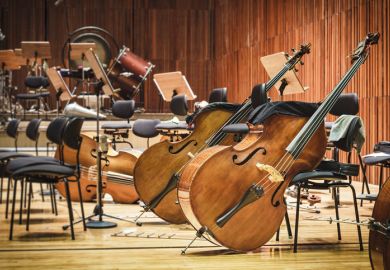With the current fashion for music and politics, and the expansion of research in British music of the Victorian and Edwardian eras, Jeffrey Richards' Imperialism and Music fills a major gap in our understanding of this complex and varied period. Moreover, with the study covering a broad sweep of the first 50 years of the 20th century - until the coronation of Elizabeth II (the last "imperial coronation") in 1953 - we are able to gauge the legacy of the British imperial mindset and its major cultural legacy that so powerfully influenced the reigns of George V and George VI.
This, indeed, is one of Richards' principal aims: to illustrate through cumulative empirical evidence that the empire continued to be an important focus of interest for the masses; and that the ideology of imperialism, firmly established by the mid-1870s, was expressed with enthusiasm in a multiplicity of artistic genres, the most powerful of which was music.
Richards establishes his "imperial" templates - of monarchism, militarism (interpreted both as belligerent and pacific forces), Protestantism, hero worship and chivalry - with detailed accounts of Sullivan and Elgar. His purpose in discussing these two seminal figures is significant, since both have been speciously reconstructed to serve the needs of those embarrassed by imperial enthusiasm. A desire to restore a true picture of Britain's passion for empire, free of post-second-world-war supra-political motives is a central theme of his book but Richards is most vituperative about the anti-imperialist reinterpretation of Elgar, who, he claims with some justification, was subject to a series of reinventions to render him acceptable to a populace that felt uncomfortable about its imperial heritage.
"If the idea that imperialism is something to be ashamed of or embarrassed about is abandoned," Richards argues, "and it is accepted as a cultural and ideological episode in British history, then it can be accepted as an element - and an important one - in the make-up of our greatest composer."
The main offenders, he suggests, are Michael Kennedy's Portrait of Elgar (1968) and Ken Russell's popular documentary film Elgar , made in 1962 for the BBC arts series Monitor . "In both of these alternative readings," the author continues, "Elgar's career, personality and interests are being wilfully distorted to fit an ex post facto rewriting of history to minimise or eliminate elements in him or his work which a later age finds distasteful, but, which it finds distasteful, I would suggest, on a misunderstanding both of history and of imperialism."
Richards' reading of Elgar, which involves the rehabilitation of Basil Maine's two-volume Elgar: His Life and Works , published the year before Elgar died in 1934, is part and parcel of his refreshingly independent and unprejudiced view of Britain's imperial past. The force of his argument, which is carried by sheer weight of evidence, sees the era "as it was" without the baggage of contemporary political or cultural reinterpretation.
Neither is it encumbered by well-trodden analyses of the imperialist phenomenon. Not only does this make the book eminently readable but the exhaustive quantity of material cited, from urban and rural sources, makes for a highly useful reference manual in which readers will find details relating to the coronations of the past five monarchs, Armistice Day, Empire Day and jubilee celebrations, particularly those of Queen Victoria in 1887 and 1897.
The intricate matrix of imperialist music is further enhanced by an equally detailed exposition of other artistic agencies, such as the "imperialist hymn" (where Britain is identified with Israel "and the favour of God's special protection") the "imperial (Hollywood) film" (in which Richards recognises a shared imperial heritage between Britain and the US), the "imperial march", the "imperial operetta" (from Sullivan's Savoy operas onwards) and the "imperial performer" - namely, Dames Albani, Melba and Butt - and, perhaps the greatest icon of them all, Peter Dawson.
Interestingly, Richards contends, the symphony and opera ignored the imperial theme, although even here, surely, the "march", that ubiquitous vehicle of imperial expression, inhabited much of the fabric of Victorian and Edwardian symphonic composition. Take the funeral march of Stanford's fine Fourth Symphony (second movement), the slow march of Parry's From Death to Life , and the overt "march" genres of Elgar's Cockaigne Overture and his two symphonies as prime examples.
This aside, Richards' study provides a compelling insight into a much-neglected area of British musical history and one that coincided with the emergence of the English musical renaissance and the mass market: "two events", Richards points out, "which had a profound effect upon the creation, production, and dissemination of British music".
Jeremy Dibble is professor of music, University of Durham.
Imperialism and Music: Britain 1876-1953
Author - Jeffrey Richards
ISBN - 0 7190 4506 1 and 6143 1
Publisher - Manchester University Press
Price - £44.99 and £17.99
Pages - 534
Register to continue
Why register?
- Registration is free and only takes a moment
- Once registered, you can read 3 articles a month
- Sign up for our newsletter
Subscribe
Or subscribe for unlimited access to:
- Unlimited access to news, views, insights & reviews
- Digital editions
- Digital access to THE’s university and college rankings analysis
Already registered or a current subscriber?



